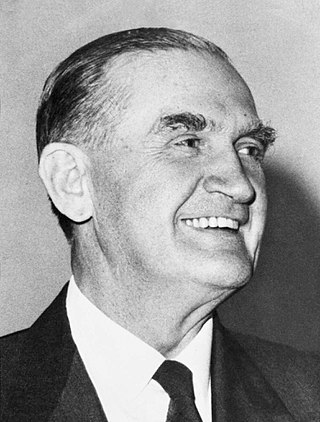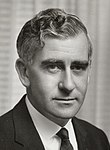
Harold Edward Holt was an Australian politician and lawyer who served as the 17th prime minister of Australia from 1966 until his disappearance and presumed death in 1967. He held office as leader of the Liberal Party of Australia.
The National Party of Australia, also known as The Nationals or The Nats, is a centre-right Australian political party. Traditionally representing graziers, farmers, and regional voters generally, it began as the Australian Country Party in 1920 at a federal level.

Sir John Grey Gorton was an Australian politician, farmer and airman who served as the 19th prime minister of Australia from 1968 to 1971. He held office as the leader of the Liberal Party of Australia, having previously been a senator for Victoria. He was the first and only member of the upper house of the parliament of Australia to assume the office of prime minister.

Sir William McMahon was an Australian politician who served as the 20th prime minister of Australia from 1971 to 1972. He held office as the leader of the Liberal Party of Australia. He was a government minister for over 21 years, the longest continuous service in Australian history.

Sir John McEwen was an Australian politician and farmer who served as the 18th prime minister of Australia from 1967 to 1968. He was the leader of the Country Party from 1958 to 1971, serving as prime minister in a caretaker capacity following the disappearance of prime minister Harold Holt. He subsequently served as the inaugural deputy prime minister of Australia from 1968 to 1971.

Sir Paul Meernaa Caedwalla Hasluck, was an Australian statesman who served as the 17th Governor-General of Australia, in office from 1969 to 1974. Prior to that, he was a Liberal Party politician, holding ministerial office continuously from 1951 to 1969.

John Douglas Anthony PC was an Australian politician. He served as leader of the National Party of Australia from 1971 to 1984 and was the second and longest-serving deputy prime minister, holding the position under John Gorton (1971), William McMahon (1971–1972) and Malcolm Fraser (1975–1983).

The deputy prime minister of Australia is the deputy chief executive and the second highest ranking officer of the Australian Government. The office of deputy prime minister was officially created as a ministerial portfolio in 1968, although the title had been used informally for many years previously. The deputy prime minister is appointed by the governor-general on the advice of the prime minister. When Australia has a Labor government, the deputy leader of the parliamentary party holds the position of deputy prime minister. When Australia has a Coalition government, the Coalition Agreement mandates that all Coalition members support the leader of the Liberal Party becoming prime minister and the leader of the National Party becoming the deputy prime minister.

Donald Leslie Chipp, AO was an Australian politician who was the inaugural leader of the Australian Democrats, leading the party from 1977 to 1986. He began his career as a member of the Liberal Party, winning election to the House of Representatives in 1960 and serving as a government minister for a cumulative total of six years. Chipp left the Liberals in 1977 and was soon persuaded to lead a new party, the Democrats who, he famously proclaimed in 1980, would "keep the bastards honest". He was elected to the Senate on 10 December 1977 and led the party at four federal elections. From 1983 it held the sole balance of power in the Senate.

The 1972 Australian federal election was held in Australia on 2 December 1972. All 125 seats in the House of Representatives were up for election, as well as a single Senate seat in Queensland. The incumbent Liberal–Country coalition government, led by Prime Minister William McMahon, was defeated by the opposition Labor Party led by Gough Whitlam. Labor's victory ended 23 years of successive Coalition governments that began in 1949 and started the three-year Whitlam Labor Government.

Leslie Harry Ernest Bury CMG was an Australian politician and economist. He was a member of the Liberal Party and served in the House of Representatives between 1956 and 1974, representing the Division of Wentworth. He held ministerial office in Coalition governments for nearly a decade, serving as Minister for Air (1961–1962), Housing (1963–1966), Labour and National Service (1966–1969), Treasurer (1969–1971) and Foreign Affairs (1971).

The Gorton government was the federal executive government of Australia led by Prime Minister John Gorton. It was made up of members of a Liberal-Country Party coalition in the Australian Parliament from January 1968 to March 1971.

The Holt government was the federal executive government of Australia led by Prime Minister Harold Holt. It was made up of members of a Liberal-Country Party coalition in the Australian Parliament from 26 January 1966 to 19 December 1967.

The McMahon government was the period of federal executive government of Australia led by Prime Minister William McMahon of the Liberal Party. It was made up of members of a coalition between the Liberal Party and the Country Party, led by Doug Anthony as Deputy Prime Minister. The McMahon government lasted from March 1971 to December 1972, being defeated at the 1972 federal election. Writing for the Australian Dictionary of Biography, Julian Leeser describes McMahon's prime ministership as "a blend of cautious innovation and fundamental orthodoxy".

The Liberal Party of Australia held a leadership ballot on 20 January 1966, following the resignation of Robert Menzies. Incumbent deputy leader Harold Holt was elected unopposed as his successor, and was sworn in as prime minister on 26 January. William McMahon defeated Paul Hasluck in the ballot to replace Holt as deputy leader.

A spill of the leadership of the Liberal Party of Australia took place on 21 March 1975. It came about as a result of Malcolm Fraser's continued dissatisfaction with the party's direction under Billy Snedden. Fraser's challenge was successful – he defeated Snedden by 37 votes to 27, thus becoming Leader of the Opposition.

An election for the leadership of the Liberal Party of Australia took place on 20 December 1972, following former Prime Minister William McMahon's resignation after his defeat at the 1972 federal election. Billy Snedden was successful in winning the leadership, narrowly beating Nigel Bowen by 30 votes to 29 on the fifth ballot. The previous ballot was tied at 29 each, with one MP not voting. James Killen, John Gorton, and Malcolm Fraser had earlier been eliminated from contention, in that order.

The Liberal Party of Australia held a leadership spill on 7 November 1969, following the party's poor performance at the federal election on 25 October. Prime Minister John Gorton was re-elected as the party's leader, defeating challengers William McMahon and David Fairbairn.

The Liberal Party of Australia held a leadership spill on 10 March 1971. Prime Minister John Gorton called for a vote of confidence in his leadership, which was tied, prompting Gorton to resign. William McMahon subsequently defeated Billy Snedden for the leadership, and was sworn in as prime minister on the same day. Gorton was elected as his deputy, defeating Malcolm Fraser and David Fairbairn.
The leader of the National Party of Australia is elected by majority vote of the federal parliamentary party. A deputy leader is elected in the same fashion. The party's longest-serving leader is Earle Page, who held the office from 1921 to 1939. The party's current leader is David Littleproud, who has held this office since 2022. It is historically rare for the incumbent leader and deputy leader to be opposed in a bid for re-election.


















